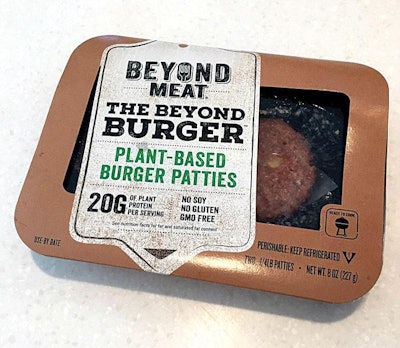
Consumers are confused by plant-based protein product marketing, finds a study conducted by the National Cattlemen’s Beef Association (NCBA).
The online survey of more than 1,800 consumers revealed that more than half (55%) respondents believed there is meat in “plant-based beef." Three in 10 thought the plant-based protein could contain animal by-products, while 17% thought small amounts of meat were allowed. Seven percent indicated that they thought plant-based beef could contain an unrestricted amount of meat.
Sales of meat alternatives surged in 2019. The plant-based retail market is currently worth $4.5 billion and is currently increasing at a rate five times faster than the total U.S. retail food sales.
Labeling confusion
When asked specifically about Beyond Meat's plant-based patties, 59% of respondents thought the cow in the company’s logo and wording like “beef” and “even meatier” suggested the product was actual meat.
“The fact that so many consumers look at these labels and think that the products include meat or other animal by-products is a clear sign that the misleading labeling and deceptive marketing practices of plant-based fake meat companies has caused real consumer confusion,” Jennifer Houston, NCBA President's president, said in a press release.
“Many of these fake-meat products purposely use graphics and words that trade on beef’s good name, and it needs to stop immediately. Consumers rely on names and product packaging to inform their purchasing decisions, and they have a right to know that this information is accurate and not misleading.”
Multiple states, including Arkansas, Louisiana, Missouri, Montana, South Dakota and Wyoming, passed labeling laws in 2019 stating that only foods derived from food-producing animals can bear labels containing the words “meat,” sausage,” “burger,” etc. An additional eight states are contemplating legislation to regulate plant-based product labeling.
According to the Federal Food, Drug & Cosmetic Act, all food labeling must be truthful and not misleading. This act is enforced by the US Food and Drug Association (FDA), the agency responsible for the production and labeling of plant-based meat.
Like what you just read? Sign up now for free to receive the Poultry Future Newsletter.


















